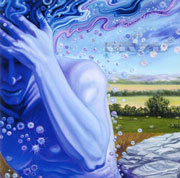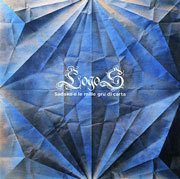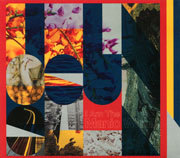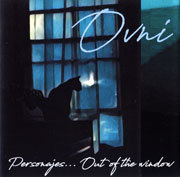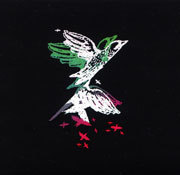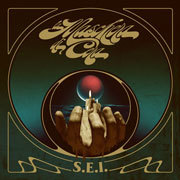
- Dick van der Heijde - PROGWERELD
- Louis de Ny - LE PETIT MONDE DU ROCK PROGRESSIF ITALIEN
- Carry Munter - NEW UNDERGROUND MUSIC
- César Inca Mendoza Loyola - AUTOPOIETICAN - APUNTES DE MUSICA PROGRESIVA CONTEMPORANEA
- BrufordFreak - PROGARCHIVES
- Gabriele Marangoni - METAL.IT
- Martinka Zandijk – van Noorloos - IOPAGES
- André de Waal - IOPAGES
- Pieter Barth - IOPAGES
- Zachary Nathanson - ECHOESANDDUST
- Serge Marcoux - PROFILPROG
- Douwe Fledderus - PROGVISION
- Valentino Butti - ARLEQUINS
- Erik Neuteboom - BACKGROUND MAGAZINE
- Artur Chachlowski - MALY LEKSYKON WIELKICH ZESPOLOW
- GARDENSHEDCD
- Yoshiyuki Oosek - GENSOU SHINPI ONGAKUKAN
- Yoshiyuki Oosek - PROGRESSIVE AWARD 2020
Het uit Milaan afkomstige Ubi Maior is al twintig jaar in de weer met hun bijdrage aan de Italo-prog. De vele jaren ervaring van de band hebben geleid tot goed uitgebalanceerde, modern klinkende retro-prog hetgeen te beluisteren valt op “Bestie, Uomini E Dèi”, hun vierde album. De band weet zoals altijd complexe, avontuurlijke muziek te serveren in behapbare brokken. Zijn deze op voorganger “Incanti Bio Meccanici” met vier nummers in een uur nog van epische proportie, op “Bestie, Uomini E Dèi” krijg je er in drie kwartier wel zes te horen. Ondanks dat de compositorische invalshoek van het nieuwe werkstuk nogal anders is, blijft de muziek qua stijl behoorlijk bij het oude.
Op de bassist na is de bezetting ongewijzigd en dat is iets om heel blij van te worden. De band is in de kern enorm aan elkaar gewaagd, oftewel, de buitengewoon kundige gitariste Marcella Arganese en de binnen progkringen redelijk bekende toetsenist Gabriele Manzini (The Watch, Archangel) weten het beste uit de ander naar boven te krijgen en dat is heel wat. Luister maar. In opener Nero Notte ondersteunt Manzini de prachtige gitaarcapriolen van Arganese met heerlijk toetsenspel, terwijl de refreinen voortstuwen en het nummer een slot krijgt met een korte flitsende synthesizersolo. Een ander staaltje fraaie samenwerking valt te horen in het daaropvolgende Misteri Di Tessaglia dat in het zwierige begin nog een tikkeltje rustiger van aard is. Het nummer krijgt een zalige rockinjectie met als resultaat een UK-achtig stuk vol muzikale lekkernijen van gitaar, toetsen en …viool. Ubi Maior heeft namelijk in de persoon van Mario Moi een zanger die naast het zingen ook prachtig viool kan spelen. De bezieling en diepgang die hij aanbrengt met z’n instrument maken het mooi. Hij heeft het niet van een vreemde. Ook z’n theatrale manier van zingen is evenals zijn vioolspel: boeiend, intrigerend en zeer op z’n plaats. Dat alles brengt hij met een expressie die aan Francesco Di Giacomo (Banco Del Mutuo Soccorso) en Derek Shulman (Gentle Giant) doet denken. Tel een en ander bij elkaar op en je hoort hoe Moi zich een weg baant tussen de Italiaanstalige teksten over mysterieuze en mythologische figuren, bloeddorstige monsters en buitenaardse wezens.
Het gebeuren neemt met zich mee dat de sfeer van het album ook z’n grimmige momenten kent, al moet gezegd worden dat Ubi Maior nooit en te nimmer weerbarstig klinkt. Wat die meer donkere stukken betreft mogen we Wendigo en het instrumentale Nessie in de pocket steken. Nessie (het koosnaampje voor het monster van Loch Ness) is een wervelende tour de force met een karrevracht aan tempo- en sfeerwisselingen. Vooral de gitaar in de finale is bloedstollend gaaf. Arganese behoort absoluut tot de beste vrouwelijke gitaristen in de wereld van de prog.
Ubi Maior is zo pur sang prog dat je geen rare dingen hoeft te verwachten. Zo gaat Fabula Sirenis dan ook gewoon met dezelfde scoop verder waar Nessie geëindigd is. Nou ja, gewoon? Fabula Sirenis gaat van start in een Genesis-achtige modus die door de hoge achtergrondzang enigszins aan de artrock van The Sparks doet denken. Ja dat is het: Ubi Maior gaat kunstzinnig te keer. Het vervolg van het nummer verdient een gouden lijstje en zo dient de afsluitende titeltrack zich aan. Bijna tien minuten lang verkeer je in de proghemel en dat komt op z’n minst door die prachtige passage van akoestische gitaar en dwarsfluit.
In de stortvloed aan nieuwe releases zal het moeilijk zijn voor Ubi Maior om “Bestie, Uomini E Dèi” een rol van betekenis te laten spelen. Het album heeft het zeker in zich om dat te zijn en het zou onterecht zijn als “Bestie, Uomini E Dèi” ergens in de vergetelheid belandde. We hebben het hier wel over een album dat voor veel liefhebbers van modern klinkende retro-prog een dikke aanrader is en voor de Italo-proggers een absolute must.
L'album est très homogène, presque compact, avec ses six morceaux d'une durée allant de 5 à 10 minutes maximum. Le titre "Nero notte" est judicieusement placé en opener afin de rassurer les fans dès les premières secondes sur la grande forme du groupe après cinq années de silence. C'est bien le cas ! Et autant vous le dire tout de suite, ces 3/4 d'heure de musique vont passer très (trop) vite.
Mention spéciale pour "Wendigo", dont votre serviteur a eu la chance de suivre la genèse, qui est une pièce d'une finesse remarquable et d'une efficacité à toute épreuve. J'avoue que le résultat final me laisse sur le cul. Quand je parle d'efficacité, il faut reconnaître qu’un morceau comme "Nessie" se pose là avec son riff d'intro dévastateur !
Car ce qui est bon avec d'Ubi Maior, c'est cette ambivalence permanente de sa musique, à la fois mélodique et énergique, à la fois symphonique et rythmée, l'apanage des grands groupes de prog italiens en quelque sorte !
Ubi Maior uit Milaan, Italië, werd in 2000 opgericht en bestaat uit: Mario Moi - zang, viool en trompet, Gabriele Manzini - keyboards en dwarsfluit, Marcella Arganese - sologitaar en akoestische gitaar, Gianmaria Giardino - basgiraar en Alessandro Di Caprio - drums.
De band bracht hun debuut album "Nostos Ubi Maior" als digitale download uit, op gevolgd door "Senza Tempo" (dd, 30 april 2009), "Incanti Bio Meccanici" (dd, 10 februari 2015) en "Bestie, Uomini Déi", dat 8 mei 2020 als CD via AMS REcords en als dd verscheen en 6 nummers bevat.
Het album begint met "Nero Notte", waarin de band een heerlijke uptempo symfonische rock song ten gehore brengt, die enkele tempowisselingen bevat en een aanstekelijk ritme heeft, dat aanzet tot beweging en gevolgd wordt door "Misteri Di Tessaglia", een prachtige song, die in een gemiddeld tempo start en na enkele minuten over gaat in een uptempo progressieve rock song met Oosterse invloeden, die een terugkerend ritme heeft, dat licht hypnotiserend klinkt, dat iets over de helft van de song opnieuw verandert en ik een stuk symfonische rock voorgezet krijg.
Daarna volgen "Wendigo", een schitterende uptempo rock song, die diverse tempowisselingen bevat en invloeden van progressieve rock heeft en over gaat in "Nessie", waarin Ubi Maior me laat genieten van een fantastisch swingend instrumentaal nummer, dat tempowisselingen heeft en invloeden van progressieve rock en jazz bevat.(luister naar dit nummer via de youtube link onder de recensie)
In "Fabula Sirenis" speelt de band een mooie symfonische rock song met een afwisselend tempo en lichte ruimtelijke invloeden, die swingt en in het titel nummer "Bestie, Uomini E Dèi" schotelt de band me nogmaals zo'n verrukkelijke progressieve symfonische rock song voor, die tempowisselingen heeft en iets over de helft van het nummer in een trager tempo over gaat en de muziek een mooi melodisch karakter krijgt en lichtelijk nostalgisch klinkt.
"Bestie, Uomini E Dèi" van Ubi Maior bevat 6 geweldige nummers, waar ik van begin tot einde van genoten heb en ik kan liefhebbers van symfonische en progressieve rock deze schijf dan ook van harte aanbevelen.
AUTOPOIETICAN - APUNTES DE MUSICA PROGRESIVA CONTEMPORANEA
Hoy tenemos el enorme placer de presentar el nuevo disco del grupo italiano UBI MAIOR, el cual se titula “Bestie, Uomini E Dèi” y fue publicado el pasado 8 de mayo. El sello a cargo de dicha publicación es AMS Records, y cuenta con la organización de BTF para su distribución comercial. El colectivo de UBI MAIOR, conformado por Mario Moi [voz, violín y trompeta], Gabriele Manzini [teclados y flauta], Marcella Arganese [guitarras eléctricas y acústicas], Gianmaria Giardino [bajo] y Alessandro Di Caprio [batería], se ha lucido a lo grande con este nuevo trabajo, el cual nos parece, desde ya, una de sus obras más destacadas. Es el primer disco del grupo donde aparece Giardino, quien reemplaza a Walter Gualtiero Gorreri. Es el cuarto álbum de esta banda formada en la localidad de Milán en 1999, logrando registrar su primer trabajo de estudio “Nostos” en el año 2005. Con “Bestie, Uomini E Dèi”, se da una capitalización decisiva de su enérgica propuesta prog-sinfónica, la cual se basa principalmente en una recuperación del legado de los nombres más notables del prog pesado de primera generación de su país (ALPHATAURUS, MUSEO ROSENBACH, IL BALLETTO DI BRONZO), más algunos elementos del sinfonismo clásico (LE ORME, GENESIS), dando a todo este crisol de influencias un armazón personal. La gente de UBI MAIOR comparte nexos con sus paisanos de LA MASCHERA DI CERA, IL TEMPIO DELLE CLESSIDRE, NOTABENE, MALIBRAN y NOT A GOOD SIGN. Al fin y al cabo, no estamos hablando de un grupo novato; de hecho, la grabación de este disco sirvió para conmemorar el vigésimo aniversario de existencia de UBI MAIOR... ¿y qué mejor manera de hacerlo que poner nuevos ítems en su catálogo? La grabación de este nuevo disco comenzó en noviembre de 2019 y ya en los primeros meses de este año se completaban los procesos de producción y mastertización del mismo. No son muchos los trabajos que el grupo ha gestado en todos estos años, pero éstos siempre han obtenido bien merecidos elogios. Tal como indica el título del álbum, las piezas contenidas en él se inspiran en personajes misteriosos, figuras mitológicas y seres ultraterrenales. Bueno, ya es hora de repasar los detalles de “Bestie, Uomini E Dèi”.
Las cosas se ponen en marcha con la impresionante dupla de los temas ‘Nero Notte’ y ‘Misteri Di Tesaglia’. El primero de estos temas comienza con un riff en 7/8 de la guitarra, siendo así que al poco rato se une el resto del bloque instrumental para explorar recursos de fastuosidad progresiva propios de la vieja escuela. La guitarra ocupa un rol crucial a la hora de reforzar los delineamientos bien encauzados del desarrollo temático, el cual tiene como columna vertebral el flujo propio de la polenta rockera en curso. Muy impresionante punto de entrada. ‘Misteri Di Tesaglia’, por su parte, ostenta una aureola más ceremoniosa, algo muy útil para que el grupo explora los matices más dramáticos de su propuesta musical. Comenzando con un arquetipo de balada sobre un compás de vals sinfónico retorcido con quiebres inusuales, el colectivo parte de allí para focalizar un desarrollo temático barroco con un muy marcado talante evocador. A mitad de camino, las cosas se intensifican y ganan en vigor rockero mientras la guitarra gana espacios para mostrar su punche en medio del nuevo motif que entró a tallar. En la sección final, la canción vuelve al espíritu ceremonioso inicial bajo la estrategia de una balada señorial: las suntuosas capas y orquestaciones a cargo de los teclados se compenetran muy bien con la parsimonia estilizada gestada por la dupla rítmica mientras la guitarra se prodiga en trucos Hackettianos. Una canción muy hermosa cuya esencia mayestática pone el perfecto contrapunto a la agilidad persistente de la canción de apertura. Un primer cénit definitorio del disco. Las cosas mantienen la prestancia de magnificencia progresiva cuando entra a tallar el tercer tema, titulado ‘Wendigo’, a la vez que acrecientan la estrategia versátil en su enfoque compositivo. En su espacio de poco menos de 8 minutos, la banda transita desde sigilosos grooves que rozan el estándar jazz-progresivo a momentos de esplendor pomposo, pasando por parajes marcados por un contundente empuje rockero. El empleo de esquemas rítmicos inusuales y la fluidez en la sucesión de los diversos pasajes realzan el talante triunfal de la pieza. Los ornamentos de violín que entran a tallar ocasionalmente complementan muy bien a las orquestaciones de los teclados. El epílogo de piano es un excelso ejemplo de romanticismo en su faceta más incandescente
El excelso instrumental ‘Nessie’, que dura poco más de 8 ¾ minutos, tiene la misión de instaurar el último gran momento culminante del álbum. Con su mezcla de estilizado vigor y refinamiento melódico, toda su secuencia de variantes temáticas se enmarca sólidamente en una sofisticada ingeniería que versátilmente se amolda a todos los cambios de atmósfera que tienen lugar. El grupo pasa con toda la naturalidad del mundo del más cálido lirismo a la fronda de tensiones estilizadas, no siendo tímido a la hora de exhibir su gusto por las rimbombancias manieristas, pero tampoco llegando a saturar. El ensamble enfila muy rectamente las baterías de su robusta expresividad sinfónica. Encarnando la cosecha sonora de ‘Wendigo’, esta pieza asienta el segundo cénit decisivo del álbum, sin duda. Tras el vitalista e incendiario caleidoscopio musical que tuvo lugar en ‘Nessie’, emerge ‘Fabula Sirenis’ como un recurso de exploración de la faceta más introspectiva de la banda. Esta pieza obedece al esquema de una balada sinfónica con algún interludio extrovertido que entra a tallar alrededor del último tercio para meter un elemento sorpresivo de dinamismo al desarrollo temático. Es mayormente sobre las escalas del órgano que reposa la fuerza de carácter de esta canción, la cual nos remite a un interesante híbrido entre los paradigmas de MUSEO ROSENBACH y los GENESIS de la fase 70-72. La pieza homónima dura casi 9 ¾ minutos, siendo la más larga del repertorio, y de paso, estando también a cargo de cerrarlo. Recogiendo algo de la espiritualidad reflexiva de la canción precedente para llevarla hacia un ambiente notoriamente más solemne, ‘Bestie, Uomini E Dèi’ se encuadra inicialmente dentro de un medio tiempo donde el entramado de la guitarra y los teclados desarrolla una gracilidad efectiva y llamativa, la cual pronto se torna en una grandilocuente solemnidad arropada por un esquema sonoro robusto. A poco de pasada la frontera del segundo minuto, nos topamos con uno de los solos de guitarra más rotundos del disco, y es justo a partir de aquí que se prepara el terreno para un nuevo motif donde el órgano ocupa un rol más protagónico. Poco antes de llegar a la frontera del cuarto minuto y medio, se arma un interludio pastoril de guitarra acústica y flauta, el mismo que vira las cosas hacia un aura contemplativa. Los últimos 3 ½ minutos están diseñados para armar la ingeniería de un epílogo hierático y solemne donde el grupo da un giro Floydiano a un encuadre melódico sinfónico inspirado en el paradigma de unos ALPHATAURUS. Esta vez es la trompeta la proveedora de elegantes ornamentos para las capas de teclados; por su parte, la guitarra elabora retazos flotantes y el piano preserva la cohesión armónica de este momento final.
Todo esto es lo que nos brindó el personal de la magnífica banda UBI MAIOR con “Bestie, Uomini E Dèi”, un disco que parece destinado a erigirse como uno de los más notables ítems de prog sinfónico del presente año 2020. Ya se hacían extrañar estos grandes músicos pero al fin tenemos un nuevo disco de ellos para nuestras colecciones. Recomendado al 100%.
The fourth album release from Italian band Ubi Maior since 2004, Bestie, Uomini e D'i shows some very adept compositional and performance skills--which results in the best RPI album I've yet heard from 2020. As with the subject selections for each song, the compositions are varied and distinctive--rendered especially so by the astonishingly chameleonic range and creativity of singer Mario Moi.
1. "Nero Notte" (6:12) great guitar and bass opening, then Neo Prog drums and keys enter to help establish the structural and melodic base before singer Mario Moi enters. Mario's voice is strong though a little warbly. Also, he sings this one with a kind of single note approach. The solid instrumental section that follows the opening vocal section begins with some nice violin before giving way to electric rock guitar. With the vocals I'm reminded of contemporary bands Syndone, Egonon, and La Maschera di Cena. (8.5/10)
2. "Misteri di Tessaglia" (7:33) very straightforward gentle ballad format that uses an ascending four-chord progression for the first section. At 2:30 things stop and restart with a heavier, more proggy palette for an instrumental section of guitar, violin, and synth taking turns over a kind of JC Superstar theme. When the vocals return the song stays heavy and full-on prog. Now this is more like it! Great finish! (13.5/15)
3. "Wendigo" (7:54) Drums get us started before spacey-guitar, keys and bass join in. FRANCESCO CIAPICA-sounding voice enters to sing. Great instrumental sections in between vocal verses. Interesting slowed down but powerful, marching URIAH HEEP-like section begins at 4:10 but then switches into an odd time signature at 5:25 to sound more GENESIS-like. Mario's performance is quite animated and powerful despite few pitchy moments. Piano becomes more prominent over drums, bass, and synth washes at 7:00, eventually taking over for a solo finish. Great song! (14/15)
4. "Nessie" (8:50) an instrumental kind of swings like a heavy INGRANAGGI DELLA VALLE song with strong organ foundation. At 1:52 a slower, more sensitive pastiche is laid for jazz and rock guitar soli. Trumpet joins in the solo celebration but with a consistent melody that makes it more part of the foundational weave. Fiery Hammond organ solo in the fifth minute before the electric violin takes a turn. Very nice, with each and every change and section feeling engaging and interesting. Electric guitars and various synths take turns exchanging war-like soli over the course of the next four minutes culminating in a guitar finish (and victory?). (18.5/20)
5. "Fabula Sirenis" (5:22) opens very smoothly with a slow full band fabric over which Mario sings with a beautifully sensitive vocal. At 1:25 the tempo picks up and a kind of GENESIS-like section transitions us to the 1:55 full-force drama for about 30 seconds before returning to the GENESIS motif for another vocal section. There is a similarity of this music and vocal performance to some of the early impassioned songs of LA COSCIENZA DI ZENO. Very well constructed and performed song. (9.25/10)
6. "Bestie, Uomini E D'i" (9:42) another heavy DEEP PURPLE-like organ-based thumping rocker over which Mario's more vulnerable, warbly voice sings. This one falls below the standards now set by the previous four songs as it is a little too simple and straightforward for the first three minutes. Even when the pace quickens, the even-beat ascending four chord progression is tiresome. Nice entry of church organ at 3:59 to support a creative electric guitar solo. A quiet acoustic guitar-supported section in the sixth minute falls a little flat--both musically and vocally- -until the piano joins in, then Mario's vocalise gets interesting and emotionally powerful. Switch to slow, piano based bluesy PINK FLOYD section at the eight minute mark (made PF-ish for its Gilmour-like slide guitar soloing). Pretty. (17.75/20)
Total Time 45:33
An album that upon first listen I had trouble connecting with, began to grow and grow on me with repeated listens. The compositional acumen of these guys is superb--as is their sense of melody. Skill levels are quite good all around (especially with the keyboard player) and very creative and refreshingly original, though I still room to grow. Now I have to go back and catch up on the band's previous three albums!
A-/five stars; a minor masterpiece of progressive rock music of the RPI kind and my favorite RPI album of 2020! (so far)
Gli Ubi Maior, con il qui presente “Bestie, Uomini e Dèi”, alle mie orecchie sono riusciti a creare il ponte ideale tra il rock progressivo italiano - con i suoi testi immaginifici dal gusto cantautorale - e il neo-prog dal respiro internazionale (penso a Pendragon e IQ).
Forti di un’esperienza pluriennale (la band è nata nel 2000), il sound personale e maturo che caratterizza il full-length rievoca artisti più o meno “prevedibili” - penso ai King Crimson ascoltando “Misteri Di Tessaglia” o al Balletto Di Bronzo nell’epica “Fabula Sirenis” - e altri non scontati (c’è qualcosa di Lucio Battisti nell’introduttiva “Nero Notte” e qualcosa di Eugenio Finardi nella sopraccitata “Misteri Di Tessaglia”).
Se l’interpretazione di Mario Moi rimanda spesso alla vocalità unica di Peter Hammill (“Wendigo”), la sezione strumentale non è da meno, come dimostrato dall’ottima “Nessie”, con il suo sound che guarda all’America dei Kansas e agli esperimenti jazz-rock del Miles Davis di fine Anni Sessanta.
Chiude il cerchio la lunga titletrack, forse l’episodio più canonico del lotto, con le tastiere che tributano Dave Greenslade da una parte e le chitarre che strizzano l’occhio a David Gilmour dall’altra, ma senza cedere mai alla nostalgia.
Bentornati Ubi Maior!
minor cessat: “Waar een meerdere is, is de mindere niet meer relevant.” Nou, dat zullen we nog wel eens zien. Hoe het ook zij en tot welke kant de band zich ook rekent, tot de mindere goden behoort zij muzikaal gezien allerminst. Ubi Maior is zo’n band die er maar niet in slaagt een matig album te maken. Het begon al bij debuutalbum Nostos (2005). Iedere andere groep zou doodzenuwachtig worden van de lof die het album opleverde, maar niet dit vijftal uit Milaan. Dat bracht vier jaar later doodleuk een al even goed ontvangen tweede uit (Senza Tempo), om in 2015 terug te keren met het fraaie Incanti Bio Meccanici. Nu, twintig jaar na de oprichting van de band, is daar Bestie, Uomini E Dèi. Aangezien de recensie met een forse spoiler begon, is het volstrekt onnodig om te schrijven dat dit verplicht voer voor de RPI-liefhebber is. Het >Milanese vijftal heeft zich door de jaren heen steeds verder bekwaamd in het schrijven van sterke composities. Waar in het verleden de gemiddelde duur van een nummer doorgaans boven de tien minuten kwam, ligt die er op Bestie onder. Vrees niet, de muziek geeft nog steeds evenveel ruimte aan de prachtige solo’s waar de band patent op heeft. Daarnaast heeft vocalist Mario Moi
flink aan zijn zang gewerkt. Qua uitdrukkingskracht en emotie overtuigt hij in elk nummer. Vooral in Wendigo
komt zijn bewondering voor Peter Hammill flink naar voren. Het is mooi om te merken hoe respectvol de klassieke Italiaanse symfo omgaat met het erfgoed van de jaren zeventig, zonder in plagiaat te vervallen. Daarnaast zijn er duidelijk neoprog-achtige trekken in de muziek te vinden. De retro insteek, de overvloedige Mellotron en andere vintage toetsen maken dit album onweerstaanbaar. En dan dat lyrische gitaarspel! Ubi Maior minor cessat: er zit wat in. Voor de vierde keer op een rij de meerdere zijn; wat een geweldige prestatie.

Kijk, als een van je geachte mederecensenten over een plaat zegt: “Ik draai niets anders
meer,” ja, dan spits je wel even de oren en ben je bereid om tegen je gewoonte in naar een Italiaanse symfoplaat te luisteren. Ik zeg dit met enige schroom, en ik weet dat ik nu tegen een flink aantal muzikale schenen ga schoppen, maar ik vind de Italiaanse zang totaal ongeschikt voor symfomuziek.
Zodra in onze mooie muzieksoort een Italiaan zijn mond opentrekt, krijg ik een waas van allerhande Eros Ramazzotti’s voor mijn ogen, en van dat theatrale gebrul word ik bepaald niet gelukkiger. Sorry hoor, smaken verschillen, weet u nog wel? Wat dat betreft word ik
niet “teleurgesteld” door Ubi Maior want de zang komt bepaald niet lekker bij me binnen. Maar wacht even, zodra de instrumentale stukken beginnen, trekt het waas snel weg, ga ik wat meer rechtop zitten en gaat zowaar de volumeknop in Huize de Waal een flink stuk open.
Vooral de viool trekt mijn aandacht vanwege de gelijkenis met King Crimsons David Cross, maar ook de gitaar gaat lekker flink tekeer. En daar waar de zanger wat onderdrukt zingt, vind ik het gebodene ook goed te pruimen. Hou je van old school symfo met een aardige dosis RPI erin en heb je geen problemen met Italiaanse zang, dan ga ik helemaal mee met mijn collega om je deze plaat van harte aan te bevelen. Is dat niet het geval, dan moet je toch eerst even zorgvuldig luisteren. Overigens, heeft iemand nog een Fries vakantiehuisje te huur? Want die geplande vakantie aan het Gardameer kan ik nu wel op mijn buik schrijven.
PDF HERE
De spannende versterkte akkoorden die opener Nero Notte introduceren, doen de oren spitsen.
Een paar maten later weet je dat dit een album wordt om van te smullen. Je bent beland in een warm bad van melodische keyboards, begeleid zoals de Proggod tijdens de schepping der ritmesecties voor ogen had.
Het gitaarsalvo voorafgaand aan de leadzang mag langer duren, maar gevoelsmatig weet je dat hij een voorschot geeft op een schat aan instrumentale orgasmen. Wat
volgt is inderdaad een onafgebroken kleurrijk, energiek en melodieus muziekpakket, passend bij ze grootse verhalen over, zoals de titel al zegt, dieren, mensen en goden.
Ook vocalist Mario Moi, die tussen zijn gepassioneerde zangpassages door naar een trompet of elektrische viool grijpt, verblijdt je.
Tijdens de tweede track Misteri Di Tessaglia past een kanttekening bij zijn hoogdravende stemgebruik, maar dat neem je vanwege de hemelse compositie graag voor lief.
Doch niet enkel Moi zet zijn volle gewicht aanhoudend in, alle bandleden lijken een onvervulde prestatiedrang te willen bevredigen, zo blijkt naarmate de plaat vordert. De ene pretentieuze uitspatting is nog niet over als de andere is begonnen.
Met de maat vlot of wat langzamer, de songstructuur op zijn climax of nog opbouwend, om zo krachtig mogelijk over te komen trekken ze
alles uit de kast, en dat is een hoop.
Pompeusheid past echter prima bij het thema, en goede prog moet rijpen, dus hou vol en geniet van de Misplaced Childhood-achtige melodieën. Maar stukken als Nessie zijn tevens beestachtige jazzrockdraaikolken die daar met de beste wil van de wereld niet mee te rijmen zijn. Dan bereik je de laatste en langste track, het titelnummer. Als de band zijn zoveelste goddelijke kakofonie over je uitstort, kan het verlangen ontstaan de handdoek in de ring te werpen en lamgeslagen wat kalmerends op te zetten. Jammer, want je weet nu niet of Bestie, Uomini E Dèi uiteindelijk orthodox-symfonisch afsluit met een fraaie, ontspannende slotpassage.

It’s been five years since Ubi Maior have put out an album after the release of their 2015 studio album, Incanti Bio Meccanici. Since their formation in 1999, Ubi Maior are considered one of the third millennium Italian progressive rock bands to come out of Milan. This year marks the 20th anniversary of the band’s formation. As the band have three studio albums in the can, they’ve unleashed their fourth release this year on AMS Records label entitled Bestie, Uomini e Dèi (Beasts, Men & Gods).
It sees them pushing the envelope a bit further as they take symphonic keyboards, intensive guitar lines, rhythms turning hypnotic clocks, and killer singing arrangements. There are moments on this album that have really struck a chord with me in how they broke their chains by unleashing some killer organ and synths structures that are like a snake eating its prey with story-telling lyrics, and heavier structures that will keep you guessing until the end.
Opener, ‘Nero Notte’ begins with the guitars going towards Pink Floyd’s Atom Heart Mother-era with some catchy rhythm sections as the mellotron and violin sets up the tension for the bass to get ready for another attack with some rising organ and lead guitar parts. ‘Misteri di Tessaglia’ has this joyful folky approach on the keyboards that brings joy and happiness for the first two minutes before it becomes a tightrope space walk to the planets on our solar system, not knowing when the danger is about to happen.
‘Wendigo’ begins with these tribal drum effects that gives the instruments a chance to swirl down into the unknown with some middle-eastern textures. There is a psychedelic ambiance that transforms itself into a cat-and-mouse sequence as it segues into the Machine Head-era of Deep Purple with snarling riffs and Ian Gillian-sque screams that would have made Greta Van Fleet shit their pants on who the real Speed King is.
With ‘Nessie’ Ubi Maior travels their Organ grooves into a Neo-Noir atmosphere as the band travel through the genres between the Rock Progressivo Italiano sound and Jazz Fusion textures with some heavy trumpet and violin touches. But I can hear some of the French prog influences that the band brought in this composition with some dark territories that crosses between Atoll and Quebec’s own Maniege in there as the title-track sees them honoring Uriah Heep on the closing track.
This was like a breath of fresh air that was badly needed despite what is happening of the pandemic since March of this year. While we’re almost getting to the end of 2020, Ubi Maior’s new album is what we all need to get away from the storm of COVID-19 and maybe a glimpse of what the roaring ’20s will be in the years to come.
Bêtes, hommes et dieux, c’est tout un programme. C’est celui que nous propose UBI MAIOR, quatre musiciens et une musicienne, originaire de l’Italie et basés à Milan. Parmi eux, trois sont de la toute première mouture discographique, « Nostos », qui date de 2005. Ce sont GABRIEL MANZINI, le fondateur claviériste et flutiste ainsi que principal compositeur, ALESSANDRO DI CAPRIO, batteur et percussionniste et MARIO MOI, chanteur, violoniste et trompettiste. Notons que M. MANZINI a officié aux claviers pour THE WATCH jusqu’en 2004, tant en studio que sur scène. La guitariste, MARCELLA ARGANESE, a rejoint le groupe pour l’album précédent, soit l’excellent « Incanti bio meccanici ». Elle a aussi collaboré avec des groupes tel ISPROJECT, HOSTSONATEN et LA COSCIENZ DI ZENO pour ne donner que ces exemples. Parlant de collaboration, M. DI CAPRIO a œuvré avec ALEX CARPANI, ALDO TAGLIAPIETRA (LE ORME), DAVID JACKSON (VAN DER GRAAF GENERATOR), LINO VAIRETTI (OSANNA), BERNARDO LANZETTI (ACQUA FRAGILE ET PFM) et DAVID CROSS (KING CRIMSON). Pour ce quatrième album, le groupe a recruté un jeune bassiste de vingt-trois ans, GIANMARIA GIARDINO dont le jeu se marie fort bien avec le talent des quatre autres compères.
Alors que la plus courte pièce de « Incanti bio meccanici » faisait neuf minutes, c’est la pièce titre du nouvel album, « Bestie, Uomini E Dèi », qui est la plus longue avec près de dix minutes. Ce qui ne change pas, nonobstant la longueur des morceaux, est la proposition musicale si typiquement italienne du groupe et ce, pour notre plus grand plaisir. Tout y est, soyez-en persuadé! Vous avez l’abondance de claviers, compositeur oblige, avec les solos de synthétiseurs, « Nero notte » et « Misteri di Tessaglia » sont de bons exemples, Hammond, pianos et Cie. On n’oublie pas la présence fort bienvenue du violon, bien sûr. Que dire de ces envolées symphoniques, des moments plus résolument rock, des passages en douceur, pastoral même ou un tantinet jazzy avec les transitions de bon aloi et ce qu’il faut de changements de rythmes, il va sans dire. La voix de MARIO MOI a le côté théâtral typique de nombreux groupes italiens. La plupart du temps elle passe bien, je pense à « Misteri di Tessaglia » ou « Fabula sirenis ». Mais sur des morceaux comme « Nero notte » ou « Wendigo » lorsque le volet rock force le ton, il est possible que certains amateurs aiment moins. Comme c’est souvent le cas pour le chant italien, il est important d’écouter pour savoir si nous sommes dans notre zone de confort vocal. Ajoutez une bien belle pochette et des thèmes forts progressifs, dieux, sirène, wendigo et autre monstre du Loch Ness et vous avez entre les mains un album qui mérite d’aller entre vos oreilles. Chaque musicien sait tirer son épingle du jeu sur un enregistrement de qualité où le découpage des instruments est fort réussi. Ainsi la guitare de MARCELLA nous paye la traite dans la pièce titre, « Bestie, Uomini E Dèi », sur « Wendigo » et « Nessie » également. Ce dernier titre instrumental est un morceau progressif redoutablement efficace dès les premières notes. Il y a même un petit peu du KANSAS de la grande époque dans ce son. Parmi les références qui peuvent surgir de nos souvenirs ou de nos connaissances à l’écoute de ces quarante-cinq minutes, je mentionne aussi UN BIGLIETTO PER L’INFERNO et IL BALLETTO DI BRONZO. UBI MAIOR a d’ailleurs repris une pièce de ces derniers sur « Nostos », leur premier album.
« Bestie, Uomini E Dèi » s’inscrit de belle façon, avec ce qu’il faut de différences, dans la discographie d’UBI MAIOR. Il marie d’agréable manière le rock progressif italien avec une attitude plus moderne, tant pas la puissance rock que par les techniques d’enregistrement. La pièce titre et « Nessie », à elles seules, méritent que vous preniez le temps de découvrir cet album.
INTRO
With their fourth album “Bestie, Uomini e Dèi” (“Beasts, Men and Gods”), the Italian progressive rock band Ubi Maior celebrate their twentieth anniversary. If you don’t know the band you will be surprised by their unique musical style and intriguing sound. In my review of the previous album “Incanti Bio Meccanici”, I wrote ... with some references to the Italian bands of the seventies the band is searching for their own voice in the progressive rock scene and is not afraid to experiment and use an unusual instrument like the trumpet in their music ... this is progressive rock in the true meaning of that word progressive ... if you like the violin in your Prog this album is for you ... an album for the lovers of RPI (Rock Progressivo Italiano).
LINE-UP
Mario Moi - vocals, violin, trumpet; Gabriele Manzini - keyboards, flute; Marcella Arganese - Electric and Acoustic guitars; Gianmaria Giardino - bass; Alessandro Di Caprio - drums
REVIEW
The album comes in a beautiful paper sleeve CD edition, with 12-page booklet including original Italian lyrics and their English translation. This is a nice gesture to their fans and friends from all over the world. They even added a small explanation of the theme of each song, in Italian and English language. For me this is the perfect booklet for a band that luckily still use their native language. This fact preserves the atmosphere and passion of the original music. By the way, the artwork is designed by our Zaubermaus (the nickname of guitarist Marcella Arganese).
In contrast to the previous album which is characterized by 4 long and complex suites, “Bestie, Uomini e Dèi” exists out of six more compact compositions. The album is not a standard concept album but the whole album is inspired by mysterious people, dark and unfortunate mythological figures, bloodthirsty monsters and beings from another world.
The album opens with the song “Nero Notte”. A myth about a boy that was kept isolated from the outside world since he was born. (The Dutch readers of progVisions will know that these strange facts can also happen in the real world). The typical Union Maior musical style is still in tact, so expect passionate sung vocals, beautiful violin parts and symphonic keyboards. The excellent guitar work of Marcella has a great diversity. Raw Rock and Blues atmospheres are interspersed with melodious and soaring parts. The song walks nicely towards a climax with passionate vocals and a freaky synth solo.
The second composition is entitled “Misteri Di Tessaglia” and is about King Admetus, by grace of the three fates, who will be able to avoid certain death if someone else sacrifices himself on his behalf. The only person willing to do so is his wife Alcestis, and he accepts. The song has an almost dreamy opening as a ballad with delicate piano, guitar and violin parts. After lush symphonic keyboards the music becomes more progressive and powerful with great violin, keyboard strings, guitars and nice synth melodies. Looking forward to hear this in a live setting. After this wonderful instrumental part the passionate vocals are returning and the band is working towards the next climax with great guitar work, lush keyboards and a pounding rhythm section. First personal highlight for me!
“Wendigo” is about the myth of a wicked creature of the Algonquian mythology. Always hungry, he hunts men down to devour them, and as he does so he grows bigger in size, strength and agility. It is said that the Wendigo was once a man, turned into a monster because of his insatiable hunger. This is of course a great story for the theatrical performance of singer Mario Moi. The music has the so needed diversity. Church organ, violin, piano, guitar, Hammond organ, the band uses their whole musical palette. The song ends with a beautiful classical piano part. Interesting fact, the first three songs are composed by three different musicians (Manzini, Arganese and Moi).
The second Manzini composition is called “Nessie”. This instrumental is about the myth of the giant that they say resides in the depths of Loch Ness (Scotland). It is a killer track with amazing keyboard and piano parts and again excellent guitar work. Love the violin parts played by singer Mario Moi. He is also responsible for the jazzy trumpet part. The band goes full throttle and their music shows great diversity. Second personal highlight for me!
After this amazing track the album continues with the second Arganese composition “Fabula Sirenis”. A song about mermaids (fantastic beings with the body of a beautiful girl ending with a fish tail). It has a dreamy opening with delicate guitar and vocal parts. First I had the impression that there were two vocalist in this song ... a male one and a female one. But after checking this with Marcella it seems that both voices are by singer Mario Moi himself. The second one is sung in falsetto. Very nice and well done. This is followed by a great synth solo and slowly the tension of the music is building up. In the end the music becomes more mellow again with nice classical piano, melodic guitar parts and lovely keyboard strings. Very nice song!
The album ends with a song of epic proportions. The title track “Bestie, Uomini e Dèi” has a duration of almost 10 minutes. It is the third composition of keyboard player Gabriele Manzini but all the songs on this fine album are arranged by Ubi Maior. So it is really a band effort. In this song Gabriele is also playing a delicate and very beautiful flute tune. The man impressed me with wonderful keyboard work on this album. Hammond organ, Church organ, delicate classical piano parts, melodic synth solo’s ... everything you could wish for. Again you will find nice guitar and violin parts in this song. After a great section with church organ and soaring guitar work, the music becomes more pastoral with acoustic guitars, piano and the already mentioned flute. Moi is bringing his vocals in a very delicate way. After this the most wonderful melodies will finds it’s way to your ears. Delicate electric guitar, that jazzy trumpet and the piano. When the music abruptly ends it is almost like an anti climax ... just because the melodies are so wonderful and beautiful ... you don’t want it to stop. It leaves the listener in a kind of shock ...
CONCLUSION
When the music abruptly ends after the most beautiful melodies of the whole album I was a little bit in shock. Disappointed that it was suddenly over. In fact this is a big compliment to the band. You suddenly wonder what the hell you listened to ... well the answer is simple ... you have been listening to a brilliant album. Four studio albums in 20 years seems not a huge output but Ubi Maior is a band that stands for quality instead of quantity. In my humble opinion Ubi Maior is one of the most intriguing and interesting bands of the RPI (Rock Progressivo Italiano) scene. Another of those bands is Syndone, but that is a story for later (new album is in the making). The music on “Bestie, Uomini e Dèi” is diverse and adventurous and is passionately performed by talented and skilled musicians. One of the best progressive rock albums of this year. Highly recommended by progVisions.
Che c’è di meglio che festeggiare i venti anni dalla fondazione (il primo album, “Nostos” è, invece, del 2005) regalandosi e regalandoci un nuovo lavoro?
Devono averla pensata così i cinque Ubi Maior nel pubblicare “Bestie, uomini e dei”, quarta release di una carriera non molto prolifica (anche se gli standard attuali non possono certo essere quelli di una volta…) ma di sicura qualità. Della formazione di “Nostos” sono rimasti il cantante Mario Moi (pure tromba e violino), il tastierista Gabriele Manzini (per l’occasione pure al flauto) ed il batterista Alessandro Di Caprio. Da “Incanti biomeccanici” si era aggiunta Marcella Arganese alla chitarra elettrica, mentre con “Bestie…” Abbiamo l’ingresso di Gianmaria Giardino al basso in vece di Gualtieri Gorreri.
Avevamo lasciato la band con “Incanti biomeccanici” del 2015, composto da due lunghe suite e da altri due brani sempre intorno ai dieci minuti, la ritroviamo ora in versione più concisa con sei brani (il più lungo dei quali sfiora i dieci minuti) per quarantacinque minuti di durata complessiva ed una “sintesi” compositiva convincente in quasi ogni composizione. Un album legato da un fil rouge rappresentato dal “mistero” nel senso più ampio del termine: figure arcane, persone “diverse”, animali di cui si favoleggia l’esistenza, mostri assetati di sangue… Ogni brano, oltre ad essere accompagnato dalle liriche, presenta brevi note esplicative circa la storia che si andrà a raccontare.
In un album di valore pressoché omogeneo, spiccano due composizioni su tutte: lo strumentale “Nessie” e la title track posta in coda alla raccolta. La prima, dopo un bell’inizio aggressivo in cui tutti gli strumenti offrono il loro contributo, si muove su coordinate quasi fusion, con la tromba di Moi a “danzare” sopra tutti, assecondata dalla chitarra della Arganese per gli inserti più heavy e dallo Hammond di Manzini.
Territori relativamente nuovi per il gruppo ma affrontati con cura e gusto, tanto che ci piacerebbe fossero esplorati con ancora maggiore convinzione nel prossimo futuro. Le ritmiche spezzettate ed ulteriori ricami di synth abbinati ai “graffi” dell’elettrica chiudono un brano di altissimo livello. La title track, che affronta la vicenda di Teseo ed il Minotauro, ha invece un convincente impatto lirico, con Moi molto “presente”al microfono, buoni spunti della sei corde di Marcella Arganese e Manzini che si lascia coinvolgere con “solos” tra lo heavy ed il più romantico e rassicurante new prog. Eccellenti anche gli intermezzi acustici tra arpeggi di chitarra, flauto e piano in cui si inserisce il cantato soffuso di Moi. L’etereo e dilatato finale è la ciliegina sulla torta a coronare una delle migliori composizioni mai prodotte dal gruppo.
Se questi due brani rappresentano la punta dell’iceberg, anche le altre quattro rimanenti composizioni non deludono le aspettative. “Nero notte”, nello specifico il cantato di Moi risulta un po’ forzato e vicino ai suoi limiti, è un bel new prog agile che si impreziosisce non poco grazie agli inserti di violino dello stesso cantante. “Misteri di Tessaglia” esordisce in modo molto delicato con piano, voce e violino ad accarezzare il tutto. La band comincia poi a mostrare i muscoli con una ritmica serrata (il duo Giardino/Di Caprio) che anticipa il “solo” ficcante della Arganese e poi di Manzini.
Il brano spicca poi il volo sul finale con la voce di Moi e la chitarra a chiudere. Un accentuato lavoro percussivo caratterizza le prime battute di “Wendigo” (un essere malvagio della mitologia algonchina) che, malgrado un buon interplay violino/tastiere, non decolla appieno dal punto di vista melodico e risultando, nel contempo, eccessivamente “verbosa”. Un piccolo inciampo, diciamo. “Fabula sirenis” è un gioiellino particolare: il cantato in falsetto di Moi, a dimostrazione di doti non comuni, aperture sinfoniche che fanno molto new prog, cosi come gli interventi dell’elettrica, pause ad effetto e pronte e stuzzicanti risalite strumentali. Davvero bello.
Abbiamo, dunque, una prova davvero convincente da parte della band milanese che ha saputo, mantenendo integra l’anima delle origini, realizzare un album di “canzoni”, molto ricche ed articolate, ma al tempo stesso rendendole fruibili e non “cervellotiche”; perché, se nelle suite ci si può permettere ogni tipo di “avventura” (sovente allungando inevitabilmente il “brodo”), nei pezzi più concisi bisogna subito focalizzare gli interventi ed essere immediatamente incisivi nella proposta, il che non sempre è di facile realizzazione. La band si dimostra, però matura ad ogni soluzione e piano piano si sta ritagliando uno spazio importante nel panorama “progressivo” italiano. Bravi.
It's already 15 years ago since I had my first musical encounter with Italian prog band Ubi Maior and its debut CD entitled Nostos, I was blown away: the sound is firmly rooted in the Classic Prog tradition and layered with vintage keyboards, especially the Mellotron sound is awesome. In those days Ubi Maior also performed on a Biglietto Per L'Inferno tribute concert, alongside legendary bands like Le Orme, Banco and Area. And Ubi Maior made an impression, and a lot of fans! I was also pleased with the successor Senza Tempo (see review) from 2009, but then I lost the band, I think because there is such a huge gap between every release, and such a huge competition with the cascades of good new Italian prog bands. Anyway, their third release Incanti Bio Meccanici (see review) is from 2015 and this new album from 2020, this means only 4 releases in 15 years! Because I was so positive about the first two releases and missed the other two I was very curious to my first musical encounter with Ubi Maior since 2009.
Well, after a few listening sessions I am very pleased to conclude that Ubi Maior still succeeds to blow me away, the entire running time! The six composition (between 5 and 10 minutes) contain lots of flowing shifting moods (between dreamy and bombastic), dynamics, tension, variety, strong work on keyboards (by Gabriele Manzini, also ex member of The Watch) and guitar (by Marcella Arganese, also Marillion tribute band Mr. Punch) and fine musical ideas. The fluent rhythm-section feautures Gianmaria Giardino on bass, and Alessandro Di Caprio on drums, he played with Alex Carpani, Aldo Tagliapietra, David Jackson, Bernardo Lanzetti and David Cross. This is topped by the inspired, slightly theatrical Italian vocals by Mario Moi who also plays violin and trumpet. What an interesting Italian prog rock line-up!
Nero Nott. First intense bluesy guitar and halfway wonderful violin work in a mid-tempo, then a sensitive electric guitar soli. In the final part a building up to a sumptuous conclusion with howling guitar, lush Hammond organ and a sensational flashy synthesizer solo. This is blended with powerful emotional vocals, an excellent start lady and gentlemen!
Misteri Di Tessaglia. Tension, dynamics and a lush instrumentation. From dreamy with piano and warm vocals to an exciting ominous atmosphere with violin, raw guitar riffs, howling electric guitar, flashy synthesizer flights and beautiful violin. And from a bombastic eruption with moving guitar and emotional vocals to an exciting grand finale featuring strong guitar work and an awesome Mellotron choir sound.
The track Wendigo delivers very powerful and bombastic music with awesome keyboards (from church organ and Hammond to tender piano), excellent guitar play (from sensitive to heavy) and swirling violin work. The compelling parts with theatrical vocals reminds me of Il Balletto Di Bronzo and the heavy parts with Hammond, guitar and violin of early Kansas.
In Nessie again hints of Kansas but also a jazzy element (trumpet), prog metal (heavy guitar, flashy synthesizer flights and thunderous drums), a swinging piano solo and romantic violin, what a variety!
The track Fabula Sienis starts mellow with twanging guitar and flageolets, halfway an acceleration to a mid-tempo beat and finally wonderful interplay between moving guitar and tender piano, another strong example of how interesting Ubi Maior works with tension and dynamics.
The final epic composition is the titletrack, close to 10 minutes, this one showcases Ubi Maior's huge potential. First a bombastic Hammond sound, romantic violin and theatrical vocals in a slow rhythm. Then sensitive electric guitar runs and again lush Hammond. Halfway an accelaration with bombastic overtones, inspired vocals, powerful Hammond, howling guitar runs and a church organ sound, how exciting. Now the climate turns into dreamy with twanging acoustic guitar and flute, this is pastoral prog like early Genesis. Next warm romantic vocals and tender piano arpeggios join. Finally a great build-up with a soaring tremolo Hammond sound, tender piano, slow drum beats and soft synthesizer flights. In the final part a pleasant musical surprise featuring flowing slide guitar runs (early Seventies Pink Floyd comes to my mind), blended with piano arpeggios and again soaring Hammond waves. What a wonderful and delicate musical idea, and what a beautiful way to end this album!
If you are up to the distinctive Italian vocals this is a very pleasant album in the genuine prog rock - and Classic Italian prog tradition, thumbs up for this new Ubi Maior album, made by five experienced and inspired musicians.
**** Erik Neuteboom (edited by Tracy van Os van den Abeelen)
Ubi Maior - Bestie, Uomini e Dei
MALY LEKSYKON WIELKICH ZESPOLOW
“This album is a masterpiece and I can say that the Italian symphonic rock has entered a new phase with this album!”
/Prog specialist shop Gardenshed review*
UBI Maior - Bestie Uomini E Dei
An album with profound mysterious taste and surely the album representing the band. A must to listen symphonic of 2020. Very creative while maintaining the Italian vintage taste.
The guitar interacts nicely with other instruments, and even the slight note of the keyboard sounds full of originality. The listener will be drawn into the story guided by the beautiful melodies.
The sound is heavy, sharp, and lyrical. The wide ranged theatrical vocal and melancholic violin fit well to the band. Overall, the music is full of creative beauty, with seriousness of the most progressiveness. The trumpet and flute occasionally add nice flavor to the sound. The 4th track is a nice one with full guitar and keyboard showing each grandioso performance.
This album is a masterpiece UBI Maior - Bestie Uomini E Dei
An album with profound mysterious taste and surely the album representing the band. A must to listen symphonic of 2020. Very creative while maintaining the Italian vintage taste.
The guitar interacts nicely with other instruments, and even the slight note of the keyboard sounds full of originality. The listener will be drawn into the story guided by the beautiful melodies.
The sound is heavy, sharp, and lyrical. The wide ranged theatrical vocal and melancholic violin fit well to the band. Overall, the music is full of creative beauty, with seriousness of the most progressiveness. The trumpet and flute occasionally add nice flavor to the sound. The 4th track is a nice one with full guitar and keyboard showing each grandioso performance.
This album is a masterpiece and I can say that the Italian symphonic rock has entered a new phase with this album!

5月もいよいよ終盤、風薫る初夏から日に々々本格的な夏へと季節は移り変わり、コロナウイルス禍で不穏に大きく揺れ動いた一ヶ月間…様々な不安要素こそ否めないものの、漸く全国規模で緊急事態宣言が解除され、新たなる前進と再生への一歩を歩み出したそんな感すら窺わせます。


Alla fine di maggio, la stagione è cambiata giorno dopo giorno dal fragrante inizio dell'estate all'estate in piena regola, e per un mese in cui il coronavirus ha tremato in modo inquietante... Non si possono negare vari fattori di ansia, ma su scala nazionale. lo stato di emergenza è stato revocato e possiamo persino vedere che abbiamo fatto un passo verso nuovi progressi e rinascite. Al giorno d'oggi, le paure e le ansie della seconda ondata dell'epidemia di coronavirus non possono essere spazzate via con i leggeri segni luminosi di luce e schiena contro schiena, ma in questi momenti, anche con l'aiuto della musica, dovremo affrontare ancora più sentimenti, stringere le nostre menti e i nostri corpi e sperare Spero solo che dovrei camminare positivamente con il mio cuore in mente.
Non è esagerato dire che la formazione di questo mese ha raggiunto il livello dei veterani della scena rock italiana del 21° secolo, insieme a La Maschera di Cera e Il Basio della Medusa.
Il quarto nuovo album di "Ubi Maior" è arrivato per la prima volta in 5 anni. Sebbene costantemente pieno di lirismo e atmosfera misteriosa dal debutto, l'energia oscura che scorre e il suono pesante che segue gli spiriti vintage degli anni '70 è ancora vivo e lo spazio sonoro superbo ed elegante che ha raggiunto un'ulteriore auto-approfondimento (evoluzione). inevitabile dimenticare il tempo per un po'.
Ubi Maior ha stabilito una solida posizione come veterano come portatore dello stile vintage Sinfonia pesante italiana del 21° secolo che sarà alla pari con Della Medusa. Sarà il 4° nuovo album per la prima volta in 5 anni dal 3° "Incanti Bio Meccanici" nel 2015, ma con il cambio di componente del lavoro precedente, si è unita la chitarrista Marcella Arganese e la gamma musicale si è ulteriormente ampliata e ora è cresciuta a dismisura. Nel lavoro, è valsa la pena che il bassista sostituisse Giammaria Giardino per rafforzare la sezione ritmica, e tutti i brani registrati sono compatti e serrati pur mantenendo il sapore dei capolavori di prima, a seconda del brano. delle varie espressioni facciali e aspetti della convivenza di lirismo e mistero, e l'abilità di fare musica che attira gli ascoltatori con un guigui che non si stanca dell'ascoltatore, e il loro benessere è finché sono felici e affidabili . Mario Moi, cantante (+ violino e tromba) e frontman, ha la stessa abilità, ma Gabriele Manzini, tastierista in una posizione da batteria, dice che l'abilità compositiva e il livello di abilità stanno sollevando il morale della band.Ma non è un'esagerazione . Il rock italiano del 21° secolo di oggi è sostenuto solo dalla loro individualità ed esistenza. Sebbene il coronavirus in tutto il mondo sia cupo in questi giorni, sono felice di vedere di nuovo opere così meravigliose e buone quest'anno.
Prog Notes Special "Progressive Award 2020"

